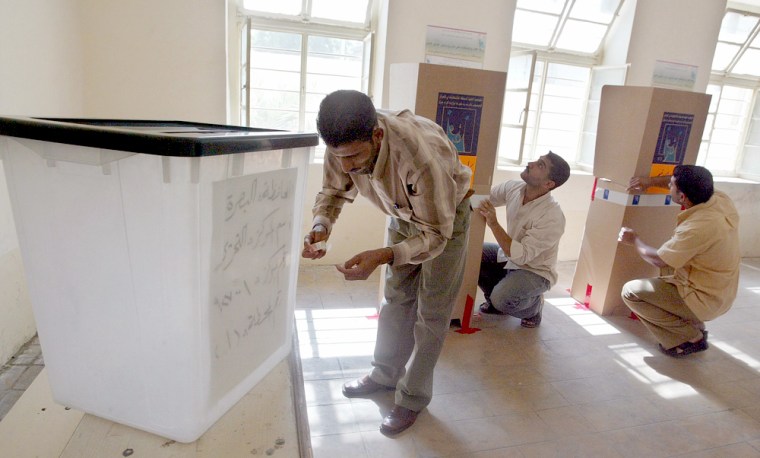The U.S.-brokered compromise here this week to make Iraq’s constitution flexible may have saved this country from collapsing into civil war — or at least postponed it a few months.
But it is a deeply flawed document, peppered with religious slogans, and leaves plenty of room for Shiites and Kurds to govern themselves.
Iraqis vote Saturday in a referendum on the constitution, which has been the cause of rancorous debate here since it was written.
Secular Iraqis, women’s groups and Arab Sunnis — who had almost no say in drafting the constitution — have been complaining that the constitution is a formula for dividing Iraq into three pieces, with the Sunnis getting the worst slice: a triangle of desert without known oil reserves. Critics also say the draft constitution gives too much authority to Shiite religious leaders friendly to the regime in Iran.
U.S. officials clearly were not happy with the proposed constitution. U.S. Ambassador Zalmay Khalilzad and Robert Ford, his Arabic-speaking political advisor, have been pushing for weeks to bring the Sunnis on board and extract compromises from the Shiites and Kurds.
Then came Wednesday’s surprise deal. It was so simple that it solved everything and nothing at the same time: Iraqi Shiites, Sunnis and Kurds agreed to disagree, and to postpone the most contentious issues until next year.
Disunity nothing new
The basic issues of national unity, Islam, the role of tribes and the sharing of natural resources remain.
That is not surprising because those issues have never been adequately worked out since Western powers cobbled Iraq together from the ruins of the Ottoman Empire after World War I.
In his book “The Emergence of the Middle East 1914-1924,” the historian Howard Sachar described the situation facing British troops when they found themselves occupying the territory they had invaded.
“As the British tightened their grip on Mesopotamia in the last year of the war, they found themselves in occupation of a ruinously neglected semi-desert, semi-swamp of 171,599 square miles," Sachar wrote in 1969.
“Its population of some three million inhabitants was a festering agglomeration of sectarian and social rivalries," he wrote.
“The Arab Muslim majority was divided almost equally between the Sunni and Shi’a [Shiite] sects, the one oriented toward Mecca, the other toward Persia [Iran], and then infinitely fractured into tribes and clans, each nurturing its private fealties and blood feuds.”
Close observers of Iraq will recognize that very little has changed some nine decades later.
Questions abound
So the question now is: should the constitution pass this Saturday’s vote?
Or, more specifically, should the document critics say contains the seeds of disunity that have riven this country since its formation be approved or rejected, thereby restarting the entire political process?
Not surprisingly, Iraqis disagree.
Many now say that because the constitution can be amended, it is worth keeping. National acceptance of the document will allow the political process to move forward, these supporters say.
And with the daily pressures of the insurgency, power cuts and lawlessness, there might not be enough time to start over before this country and the people lose hope — along with many of their lives.
